
As the dust settles over the northern Gaza Strip and the world fearfully watches an impending doom in the south of Gaza, India’s External Affairs Minister Jaishankar’s words ring loudly: “We are defined more by how much we are alike than our differences.”
While virtually addressing the 55th Session of the Human Rights Council, Mr Jaishankar said, “The conflict in Gaza is of great concern to us all. The humanitarian crisis arising from conflicts requires a sustainable solution that gives immediate relief to those most affected. At the same time, we must be clear that terrorism and hostage-taking are unacceptable.”
Jaishankar’s remarks came in the wake of the mounting human rights crisis in the Rafah border area with 1.4 million refugees, Egypt’s warnings against the influx of these refugees, and Israel’s latest airstrikes in Baalbek, Lebanon, for the first time since the Gaza conflict started. “It also goes without saying that international humanitarian law must always be respected. It is vital that the conflict does not spread. And efforts must also focus on seeking a two-state solution where Palestinian people can live within secure borders,” he added.
His remarks underscore India’s nuanced and multi-layered approach to the Israel-Hamas conflict. India has traditionally supported the Palestinian cause, emphasising the need for a two-state solution that ensures the establishment of an independent and sovereign Palestinian state coexisting peacefully alongside Israel. This stance is rooted in India’s experience with colonialism and its commitment to principles of self-determination and sovereignty.
Another layer to India’s response is its “zero-tolerance for terrorism” policy, again due to its experience with harrowing radical terrorist attacks in the homeland. India has also strengthened its ties with Israel in recent years, particularly in areas such as defence, technology, and counter-terrorism. This balancing act reflects India’s pragmatic foreign policy approach, which seeks to maximize strategic partnerships while maintaining its traditional support for the Palestinian cause.
“Let me recall what Indian civilizational thought has always emphasized that the world shares one earth, we are one family and we have one future. Both as a motivating vision and as a call for action, this Indian approach is one of recognizing that we are defined more by how much we are alike than by our differences,” said Jaishankar.
“But the many are impacted by the choices made by even a few and that this interconnectedness means a genuine dialogue as the only way to find solutions is not just an imperative but, in fact, inevitable,” he added.

Time and again, Dr Jaishankar has articulated India’s position on the Israel-Gaza conflict emphasizing the need for an immediate ceasefire and expressing concern over the escalation of violence. Jaishankar has reiterated India’s longstanding support for the Palestinian cause and called for a return to negotiations to achieve a lasting and sustainable peace in the region.
India’s commitment to multilateralism and diplomacy as the preferred means to resolve conflicts has been evident. India, as a non-permanent member of the UN Security Council, had used its platform to advocate for a peaceful resolution to the Israel-Gaza conflict and to highlight the humanitarian implications of the violence on civilian populations. Jaishankar called for urgent efforts to fix the systemic flaws in global institutions so that multilateral frameworks can respond to these crises effectively.
“It is therefore in our collective interest and responsibility to work together in the UN and outside to find lasting solutions to geopolitical challenges. For this to happen it is vital that we first recognize that for multilateralism to be credible, effective and responsive it is now high time to reform outdated structures and fix systemic flaws and urgently make multilateral frameworks fit for purpose reflecting current global realities. Let me conclude by reaffirming India’s steadfast commitment to global promotion and protection of human rights and to their enjoyment by our people,” said Jaishankar.
The UNRWA figures reveal that aid delivery to Gaza fell by half and at least a quarter of Gaza’s population is one step away from famine. Against the backdrop of the escalating violence, impending conflict spillover, and humanitarian crisis, India’s voice should be heeded by all parties concerned: “Gaza conflict should not spread within and beyond the region.”
(Deepakshi Bhardwaj contributed inputs for this article.)
Author Profile
- India Writes Network (www.indiawrites.org) is an emerging think tank and a media-publishing company focused on international affairs & the India Story. Centre for Global India Insights is the research arm of India Writes Network. To subscribe to India and the World, write to editor@indiawrites.org. A venture of TGII Media Private Limited, a leading media, publishing and consultancy company, IWN has carved a niche for balanced and exhaustive reporting and analysis of international affairs. Eminent personalities, politicians, diplomats, authors, strategy gurus and news-makers have contributed to India Writes Network, as also “India and the World,” a magazine focused on global affairs.
Latest entries
 DiplomacyJanuary 5, 2026India walks diplomatic tightrope over US operation in Venezuela
DiplomacyJanuary 5, 2026India walks diplomatic tightrope over US operation in Venezuela India and the WorldNovember 26, 2025G20@20: Africa’s Moment – The Once and Future World Order
India and the WorldNovember 26, 2025G20@20: Africa’s Moment – The Once and Future World Order DiplomacyOctober 4, 2025UNGA Resolution 2758 Must Not Be Distorted, One-China Principle Brooks No Challenge
DiplomacyOctober 4, 2025UNGA Resolution 2758 Must Not Be Distorted, One-China Principle Brooks No Challenge India and the WorldJuly 26, 2025MPs, diplomats laud Operation Sindoor, call for national unity to combat Pakistan-sponsored terror
India and the WorldJuly 26, 2025MPs, diplomats laud Operation Sindoor, call for national unity to combat Pakistan-sponsored terror







